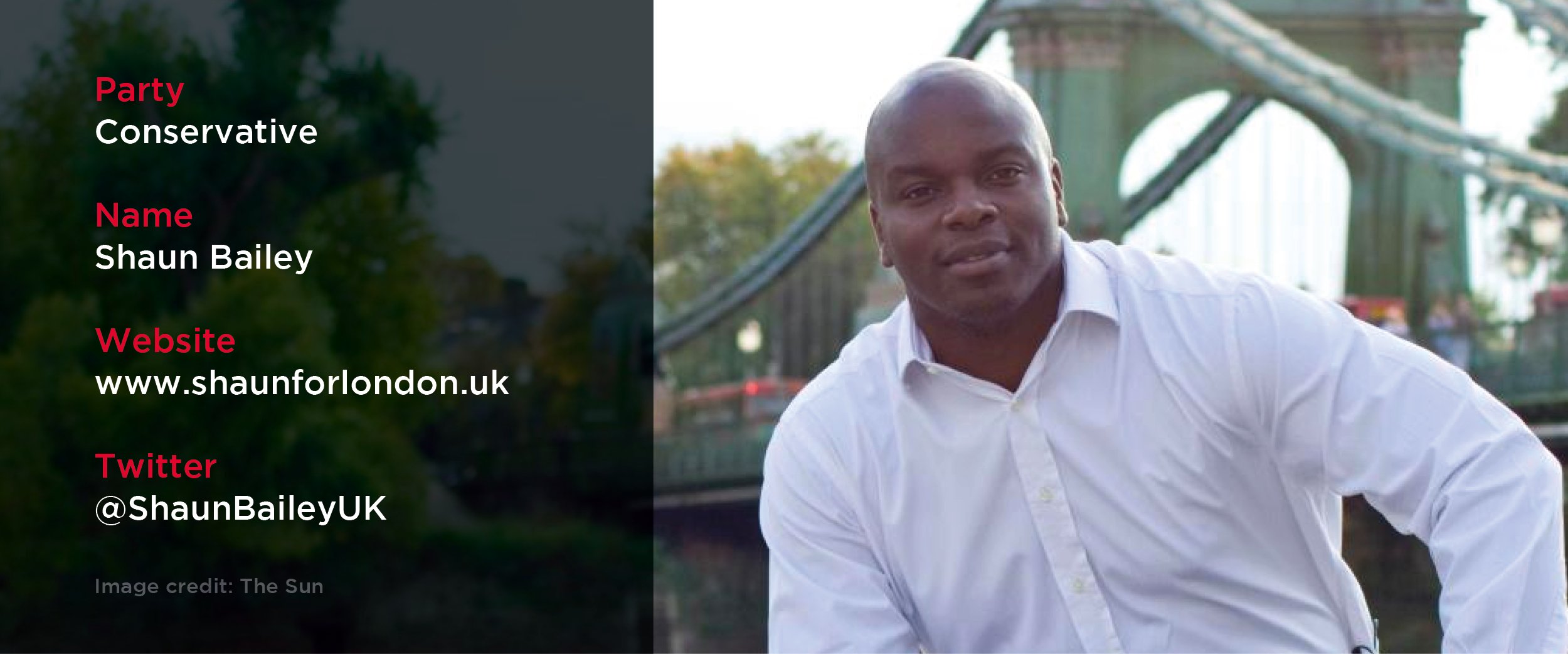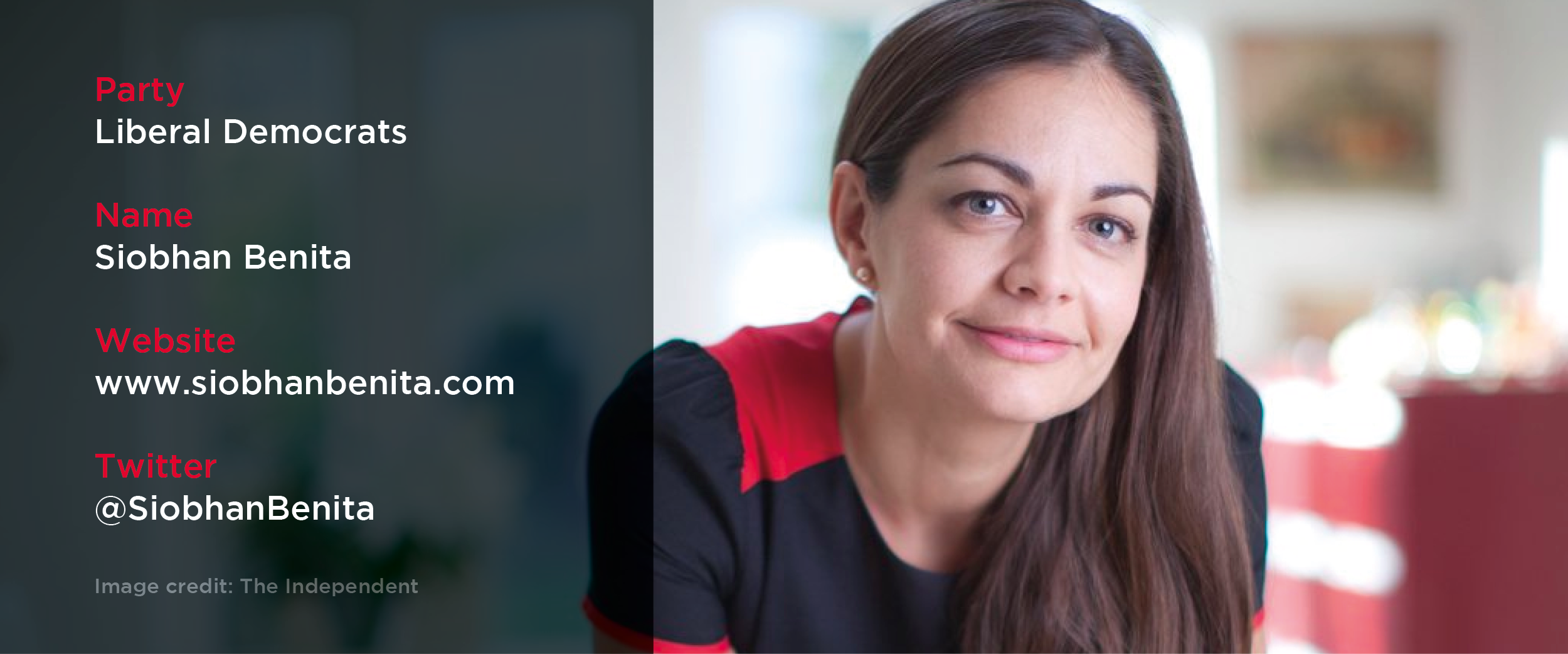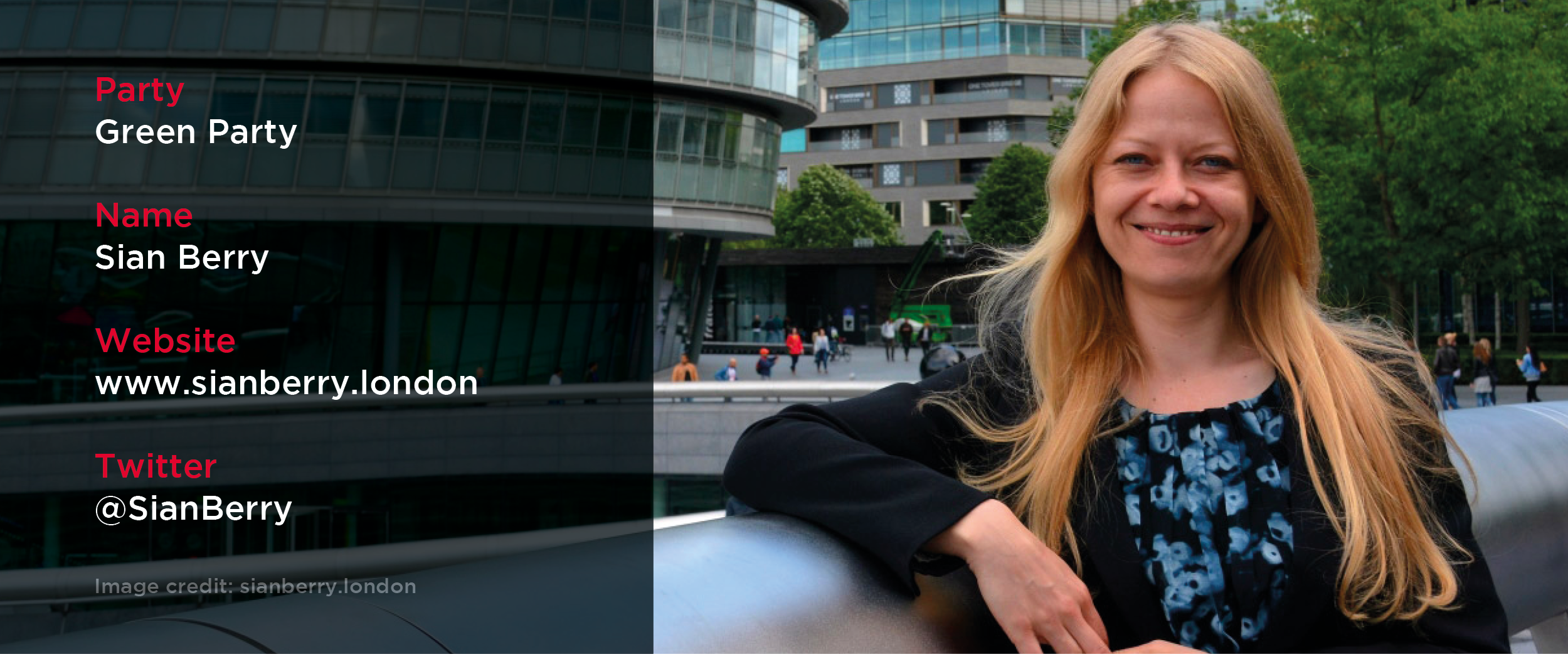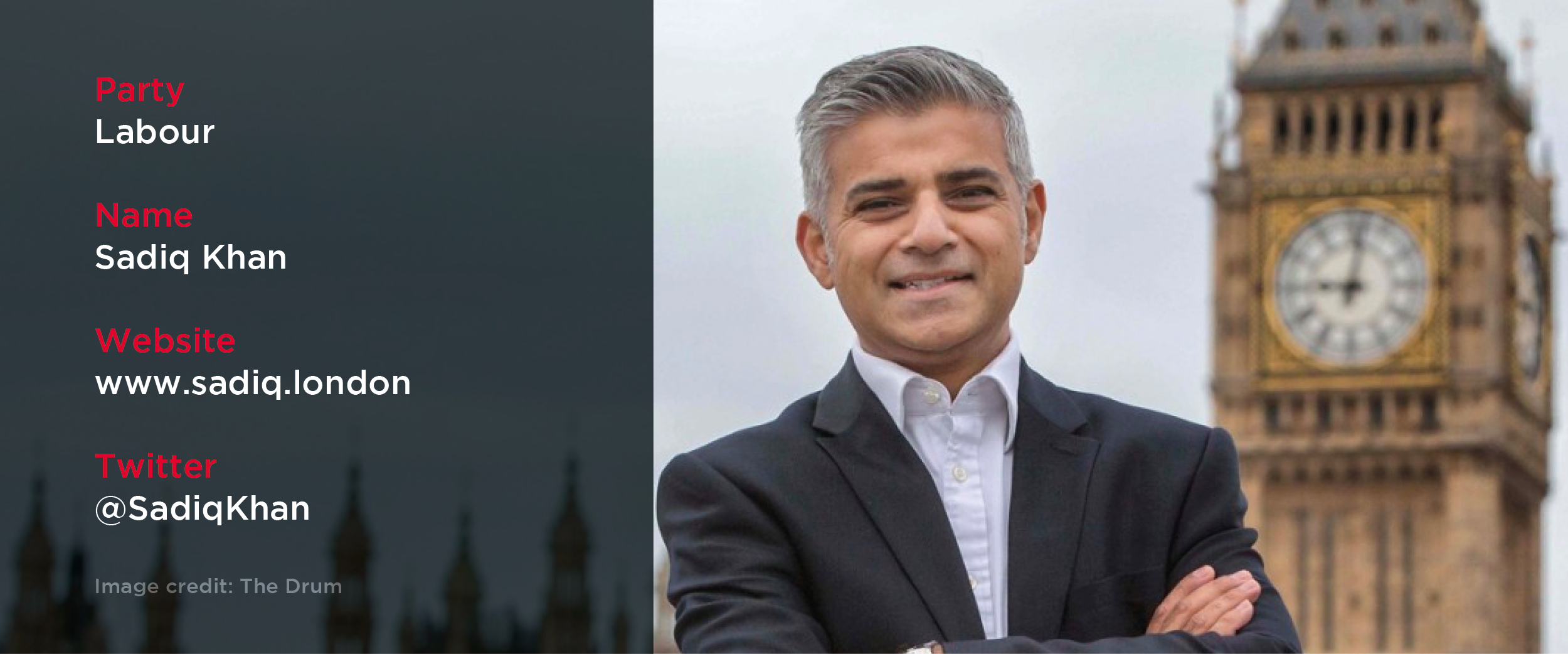Posted: 06.05.19
2020 Mayoral Elections: Meet the Candidates
The next GLA Elections are scheduled for 7 May 2020 and will see Londoners go to the polls to pick their next Mayor, as well as 25 London Assembly members. With a year to go, LCA Research Manager Stefanos Koryzis presents the runners and riders contesting the Mayoralty – focusing on how they were selected, their electoral aims and prospects, as well as early clues as to campaign themes.
|
Selection: The Mayoral incumbent was reselected by Labour last September through an ‘affirmative ballot’ process which saw him win the support of more than 50% of local constituency parties and affiliates. His success in 2016, fairly consistent approval ratings and reputation as a fearsome campaigner made him a strong candidate from the get-go, though it is understood activists from further on the party’s left put up a spirited fight – if only to signal that his reselection was not a given. Election aims: The latest available voting intention polling, carried out in December 2018 by YouGov for the Mile End Institute at Queen Mary University of London, suggested Khan was likely to beat his opponents with a wide margin next year. However recent YouGov satisfaction ratings have seen him dip into a minus score, and the next Queen Mary University poll on London is expected shortly. He is thought to be in it to win it, perhaps even in the first round. Doing so would mark yet another major career milestone, having won the 2016 Mayoral election with the largest number of votes ever won in an election by any individual politician in Britain, as well as by becoming London’s first Mayor of Muslim faith. But to retain his lead, Khan must address nagging doubts about his performance in key areas such as policing, housebuilding and delivering Crossrail. Campaign themes (thus far): It’s early days, but Sadiq is certain to put a lot of energy into defending his track record and arguing he should see through key policies launched in his first tenure. It is also likely that he will top and tail almost every public statement with demands for an end to austerity and greater financial devolution (as well as, of course, criticism of the government’s handling of Brexit). Sadiq has also told the Guardian that rent controls will be a ‘key plank’ of his re-election bid. Finally, the expanding influence of Momentum and trade unions in London Labour’s regional and local branches could lead to a more radical, left-leaning manifesto compared to 2016.
|

Selection: The London Tories elected Bailey as their candidate before last year’s autumn Party Conference season and he was billed for a speech from the main conference stage in Birmingham (a privilege that Khan was not extended by his own party). He beat long-serving fellow Assembly Member Andrew Boff and Ealing Councillor Joy Morrissey albeit a mere 7,000 Tory members voted (with Bailey receiving 3,164 of these) out of a reported total 15,000 party members in the capital This shows the dire state of the party in London (the turnout for Boris Johnson’s selection as Tory mayoral candidate in 2008 was twice that) and the need for a recruitment drive before the campaign really gets going.
Election aims: Voting intention polling thus far has seen Bailey solidly in second place, but trailing behind Khan. For all that he is an Assembly Member, a former Parliamentary candidate (2010, Hammersmith) and one-time advisor of David Cameron, Bailey remains a far less recognisable figure than Sadiq Khan, but also previous Tory candidates Boris Johnson and Zac Goldsmith. His campaign has so far been haunted by controversial past statements, though he is fighting back with an extensive local media campaign. Crucially, demographic and electoral trends have eroded the Tories’ electoral base in London. They will nevertheless be hoping that his buoyant personality, working class origins and background as a youth worker will serve to at least begin reversing those trends.
Campaign themes (thus far): Youth work and tackling crime are arguably Bailey’s strong suits and he has already campaigned extensively on these issues. In line with the GLA Conservatives’ wider stance, his campaign has from the get-go placed a heavy emphasis on painting Khan as untrustworthy, incompetent and profligate in his stewardship of policing, transport and other key services. Most of his pledges thus far are lacking in detail, but contain an intriguing combination of small-state Conservatism, with a more interventionist approach in areas including housing.

Selection: The Liberal Democrats selected Siobhan Benita as their Mayoral candidate last November, ahead of humanitarian aid worker Lucy Salek, entrepreneur Dinesh Dhamija and economist-turned-consultant Rob Blackie. This is the second time that Benita has run for Mayor – though she stood as an independent in 2012, coming fifth in first preference votes.
Election aims: Benita has a solid track record in the public and higher education sectors and can draw on her experience (and decent performance in 2012, for an independent). She nevertheless ranked, in fourth place, behind the Greens’ candidate in polling back in December. Furthermore, while she appears to be busy campaigning on the streets and via social media, she has achieved very little cut-through in the press. In a strongly pro-Remain city and considering Labour and the Tories are struggling with internal divisions, this should be the Lib Dems’ time to shine and the local election results outside London last week nationally will have boosted morale. But by the look of it, Benita has a lot of work ahead of her to secure third place – let alone the Mayoralty.
Campaign themes (thus far): Benita’s campaign seems to be keeping its cards closed on policy. Her ongoing Crime Survey and a speech at her party’s March conference suggests this will be a key issue. The Liberal Democrats’ solitary AM, Caroline Pidgeon, is likely to be heavily involved in Benita’s campaign, meaning that transport (her specialty) can be expected to be prominent. Social media activity suggests Benita is still doing the rounds, talking to party members and other stakeholders as she constructs her campaign’s narrative.

Selection: The Greens will again be led into the 2020 poll by Sian Berry, who previously ran for Mayor in 2008 and 2016 (placing fourth and third respectively). A members’ ballot in February saw her beat Peter Underwood, Shahrar Ali, and Zack Polanski – and while the detailed results are not in the public domain, it may have been somewhat concerning that turnout was low, at 9.8%.
Election aims: Berry wears many hats, being an Assembly Member, Camden Councillor, and co-Leader of the national Green Party. A seasoned campaigner, she has a relatively strong public profile and is often featured in the mainstream media. December’s YouGov polling saw her rank third, but with a big margin between her and Bailey. While unlikely to win outright, her party will be aiming for a strong showing and at least third place, to help cement its place as the alternative to Labour and the Conservatives in London. As with the Lib Dems, the Greens will have been buoyed by the local election results last week.
Campaign themes (thus far): In the statement following her selection, Berry made it clear that housing will be at the centre of her campaign, calling for the creation of a ‘People’s Land Bank’. Berry has long campaigned for rent controls, abolishing Section 21 evictions and introducing resident ballots in estate regeneration – all of which are now squarely at the centre of mainstream policymaking. With that in mind, her positions could compel the frontrunners to adjust their own housing pledges.
Who else is running?
The Mayoral election always attracts candidates from smaller parties and independents. 2020 is no exception:
- UKIP has yet to select a Mayoral candidate. It has performed poorly in London since 2016 and appears unlikely to achieve much in 2020, especially if the Brexit Party fields a candidate, splitting the Leave vote – and they are unlikely to stand if Brexit has been achieved by then.
- We already know that Professor Sue Black – a computer scientist, government adviser and social entrepreneur – will be running for the Women’s Equality Party.
- Charlie Mullins (of Pimlico Plumbers fame) and Prince John Zylinski (who contested the Mayoralty in 2016, and the 2018 Local Elections with “Polish Pride”) have said they will run as independents.
- The Independent Group (TIG), which aims to contest a European Parliament Election under the banner of ChangeUK, could be the springboard for a strong Mayoral candidate. Streatham MP Chuka Umunna was tipped early on, but has since declared that he has no such desire.
Looking forward
While he remains by far the strongest candidate, Sadiq should not be considered invincible. A year is an extremely long time, especially in the context of so much uncertainty. Don’t forget that between now and May 2020 we are almost certainly going likely to be voting in European Parliament elections (between 23 and 26 May) unless Mrs May manages to get her Withdrawal Agreement approved by Parliament and ratified before 22 May (which is very unlikely), and potentially even a snap General Election. For all we know, the Mayoral elections could be fought under a Labour Government led by Jeremy Corbyn (albeit more likely based on current polling, to be a minority or coalition one). To make the entire picture even more complicated, the still-elusive final outcome of the Brexit process could also affect the line-up and outcome of the 2020 London elections.
In the months ahead, LCA will be keeping an eye out for the Mayoral candidates’ full manifestos. Even if Sadiq proves to be a shoo-in, his pledges are bound to be influenced by Labour’s internal politics as well as his opponents’ rhetoric. These could, in turn, influence his policies in a potential second term. We look forward to reporting further on the 2020 Mayoral and Assembly elections candidates, campaigns and manifestos, in future blogs and of course LDN, our free weekly newsletter.

